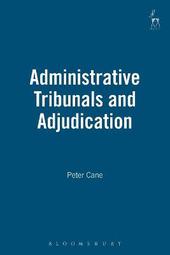
|
Administrative Tribunals and Adjudication
Paperback / softback
Main Details
| Title |
Administrative Tribunals and Adjudication
|
| Authors and Contributors |
By (author) Professor Peter Cane
|
| Physical Properties |
| Format:Paperback / softback | | Pages:312 | | Dimensions(mm): Height 234,Width 156 |
|
| ISBN/Barcode |
9781849460910
|
| Classifications | Dewey:342.06 342.940664 |
|---|
| Audience | | Professional & Vocational | |
|---|
|
Publishing Details |
| Publisher |
Bloomsbury Publishing PLC
|
| Imprint |
Hart Publishing
|
| Publication Date |
29 June 2010 |
| Publication Country |
United Kingdom
|
Description
Among the many constitutional developments of the past century or so, one of the most significant has been the creation and proliferation of institutions that perform functions similar to those performed by courts but which are considered to be, and in some ways are, different and distinct from courts as traditionally conceived. In much of the common law world, such institutions are called 'administrative tribunals'. Their main function is to adjudicate disputes between citizens and the state by reviewing decisions of government agencies - a function also performed by courts in 'judicial review' proceedings and appeals. Although tribunals in aggregate adjudicate many more such disputes than courts, tribunals and their role as dispensers of 'administrative justice' receive relatively little scholarly attention. This wide-ranging book-length treatment of the subject compares tribunals in three major jurisdictions: Australia the UK and the US. It analyses and offers an account of the concept of 'administrative adjudication', and traces its historical development from the earliest periods of the common law to the twenty-first century. There are chapters dealing with the design of tribunals and tribunal systems and with what tribunals do, what they are for and how they interact with their users. The book ends with a discussion of the place of tribunals in the 'administrative justice system' and speculation about possible future developments. Administrative Tribunals and Adjudication fills a significant gap in the literature and will be of great value to public lawyers and others interested in government accountability.
Author Biography
Peter Cane is Distinguished Professor of Law at the Australian National University College of Law. His other publications include Administrative Law 4th edn (Oxford, OUP, 2004) and (with Leighton McDonald) Principles of Administrative Law: Legal Regulation of Government (Melbourne, OUP, 2008). He is a Corresponding Fellow of the British Academy and a Fellow of the Academy of Social Sciences in Australia.
ReviewsAdministrative Tribunals and Adjudication is a work of considerable scholarship, which throws new light on an important set of institutions that have not hitherto received the attention they deserve. Michael Adler Journal of Law and Society Volume 37, Number 3, 2010 Professor Cane's excellent book helps to redress the lack of academic attention paid to administrative tribunals...This is an outstanding account of Australian tribunal adjudication and its place in the regime of administrative decision-making and law. The detailed and sophisticated use of comparative law analysis helps to understand the choices that have been taken in Australia, what some of the alternatives were (and are), and also the constraints that will continue to shape administrative adjudication. Edward Santow Public Law Review 2010 Issue 21 Cane presents a precise, richly detailed account of administrative organizations, grounded in an impressive survey of the administrative law literature and Cane's own observations ... Such a detailed account is valuable because, as Cane notes, there is not much literature outside of Australia about what administrative tribunals do. Readers will come away impressed with the breadth of research that Cane has conducted on these tribunals and the care with which he details the differences among them. Robert J. Hume Law and Politics Book Review April 6, 2010 The book is clearly and elegantly structured into seven chapters each analysing a different aspect of tribunals. The strengths of this book are to be found principally in the subtle blend of different types of analysis - constitutional, historical and comparative - used to appreciate the role and significance of tribunals. Cane presents a very scholarly and well-informed synthesis of three dimensions of tribunals: their functions across four jurisdictions, their historical development, and their constitutional significance. This book is very much to be welcomed as an excellent addition to the literature. It provides a valuable and wide-ranging study of an important but long neglected set of institutions and it should encourage administrative law scholars to pay much more attention to the work of tribunals. Robert Thomas The Cambridge Law Journal Volume 70, Part 1
|